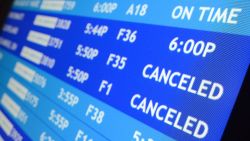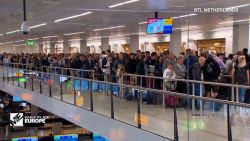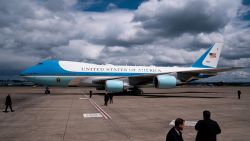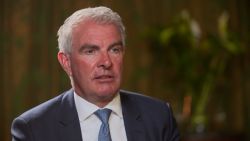CEOs and union leaders joined together Tuesday to plead with Congress for another $28 billion in federal help for the battered airline industry, saying that 100,000 good paying jobs in the industry will be lost next week without the help.
The joint event in the shadow of Capitol Hill comes at a time of rising partisan rancor in Congress over the fight on filling the seat of Justice Ruth Bader Ginsburg, who passed away Friday. But the executives and union leaders insist that they have support from both sides of the aisle and in both the House and Senate to get a deal done.
“The group you see in front of you is keenly aware of the high stakes of this moment in time for our nation and our federal government,” said Doug Parker, CEO of American Airlines (AAL), the nation’s largest airline, which is prepared to lay off 19,000 workers next week without additional help. “We understand that the attention of Congress is trained on … determining a path forward for the seat on the court that is now vacant. But we all know that is far from the only challenge the country faces. We’re here today with a message of urgency.”
The original $25 billion in grants for the airline industry included a prohibition on involuntary job cuts before Oct. 1, but with that date approaching, tens of thousands of workers have been notified already that they’re about to be out of work. But the airline officials insist that last minute help from Congress could still keep those job cuts from taking place.
“We have not missed the window,” Nick Calio, CEO of Airlines for America, the industry trade group, told CNN ahead of the event.
The unions and executives said their preferred solution is a financial relief bill that addresses the airline industry and the broader economy, but they said they’ll take whatever help they can get. On Monday, Sens. Susan Collins and Roger Wicker, both Republicans, introduced a measure to provide the help to the airline industry alone.
The industry leaders argued the airline business is vitally important to the US economy, and that the industry losing this many good paying jobs at once is a blow that the economy can’t withstand. They also argued that once the jobs are lost it will take time to once again train and certify airline employees, such as pilots, flight attendants and mechanics who have lost their jobs.
“You can’t just throw the keys at the pilot and say ‘Start the airplane.’ It takes a long time,” Calio told CNN.
The union and airline leaders said the earlier relief package for the airlines was made on the assumption that air travel would be closer to normal by the fall, but that has not happened. The summer travel season has ended with less than half the passenger traffic of a year ago, and bookings are expected to be down even more through much of the fall.
“Hope is on the horizon, but we need more help to get over that horizon,” said Eric Ferguson, president of the Allied Pilots Association, which represents pilots at American Airlines. “We must act now to prevent catastrophic damage to the economic engine of the US airline industry. We do not have enough fuel in our tanks. We need Congress to refuel our tanks, keep us going and get us over the horizon.”
United Airlines (UAL) CEO Scott Kirby insisted that another $28 billion in help for airlines wouldn’t just delay the inevitable job cuts. He said if the industry can get six more months of help, it will have a better idea as to when there will be a resumption of more normal levels of air travel, especially if there is news by then about a Covid-19 vaccine.
“The problem for us today is that [a vaccine] is so far over the horizon we put our companies at risk,” said Kirby. “By the time we get to March, even if we’re not past the coronavirus, and there’s a good chance we won’t be past it by then, but we’ll have a lot more certainty and we’ll be able to see the light at the end of the tunnel. “
At the event was both Rep. Peter DeFazio, an Oregon Democrat and the chairman of the House Transportation & Infrastructure Committee, and Rep. Sam Graves, a Missouri Republican and the ranking member on that panel. Both voiced support for reaching a deal.
“One hundred thousand jobs on the line, primarily union jobs, family wage jobs … 100,000 people in one day. That’s a big hit,” said DeFazio.
“This isn’t a bailout. This isn’t the result of bad corporate decisions or bad business decisions,” said Graves. “It’s imperative that we see this extension done.”




























